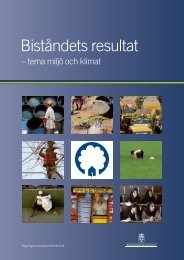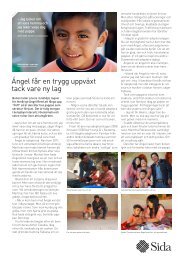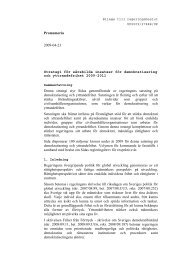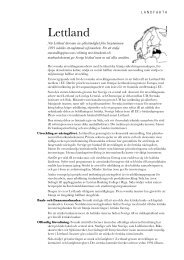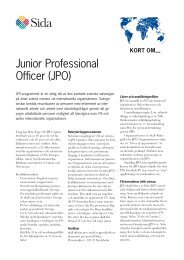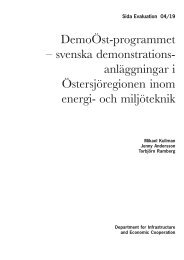Mid-Term Review of the AGIR Programme - Sida
Mid-Term Review of the AGIR Programme - Sida
Mid-Term Review of the AGIR Programme - Sida
Create successful ePaper yourself
Turn your PDF publications into a flip-book with our unique Google optimized e-Paper software.
2 F I N D I N G S<br />
<strong>the</strong> area <strong>of</strong> capacity streng<strong>the</strong>ning as it relates to a range <strong>of</strong> critical issues. These<br />
issues included:<br />
Intermediary communication and timely announcement <strong>of</strong> courses – as an example,<br />
one CSO partner received information about a gender course given by<br />
an intermediary shortly before <strong>the</strong> course began and missed <strong>the</strong> opportunity.<br />
Timing <strong>of</strong> specific training in relation to associated partner activities - various<br />
partners have received training in gender, strategic planning and M&E after<br />
<strong>the</strong>y had elaborated <strong>the</strong>se instruments.<br />
Form - The courses are always classroom courses; o<strong>the</strong>r ways <strong>of</strong> facilitation<br />
and learning could be introduced to improve impact and skills, e.g. mentoring.<br />
Continuity – More continuity is needed, with different trainers in related issues<br />
sometimes applying different approaches.<br />
Mixing <strong>of</strong> participants with different skill levels – various partners, especially<br />
more established ones, find that <strong>the</strong> benefit <strong>of</strong> training is reduced due to <strong>the</strong><br />
mixing <strong>of</strong> participants with different skill levels. One partner finds that ‘<strong>the</strong><br />
training typically assumes that <strong>the</strong> participants have <strong>the</strong> same level’. In <strong>the</strong><br />
experience <strong>of</strong> ano<strong>the</strong>r partner, ‘one <strong>of</strong> <strong>the</strong> most useful courses, was <strong>the</strong> one<br />
where we all had <strong>the</strong> same level <strong>of</strong> skill, <strong>the</strong> debate was extremely fruitful as<br />
partners at <strong>the</strong> same level could exchange experiences’. This opinion is however<br />
not shared by all, as one person from IBIS states, ‘training should have a<br />
mix <strong>of</strong> levels, <strong>the</strong> stronger should support <strong>the</strong> weaker’.<br />
Obligation – many leaders <strong>of</strong> partner organisations are dissatisfied with <strong>the</strong><br />
constant obligation <strong>of</strong> <strong>the</strong> leadership to participate in all capacity building<br />
events. Leaders feel <strong>the</strong>y are called to many capacity building events, and that<br />
intermediaries persistently insist that leadership must always participate, even<br />
though <strong>the</strong>y sometimes feel that <strong>the</strong>y have knowledge in <strong>the</strong> course subject<br />
and that it would be more beneficial to <strong>the</strong>ir organisation for <strong>the</strong> relevant programme<br />
<strong>of</strong>ficer to participate.<br />
Addressing needs – many, especially more experienced partners, find that capacity<br />
development should be tailor-made to meet <strong>the</strong> partner’s specific needs<br />
to a greater extent. While this does happen with <strong>the</strong> intermediaries, more <strong>of</strong><br />
<strong>the</strong>se tailor-made courses would be appreciated by CSOs.<br />
Tools– Oftentimes, training does not provide tools for post-training support<br />
that <strong>the</strong> trained can use on a daily basis.<br />
Training <strong>of</strong> trainers and tools – A number <strong>of</strong> partners are forums, networks<br />
etc. with a considerable number <strong>of</strong> member organisations - replication <strong>of</strong> <strong>the</strong><br />
training <strong>the</strong>refore becomes important. Some <strong>of</strong> <strong>the</strong> intermediaries already use<br />
this process to ensure sustainability.<br />
Differentiation – capacity development should be more differentiated in order<br />
to address <strong>the</strong> raised concerns.<br />
42




